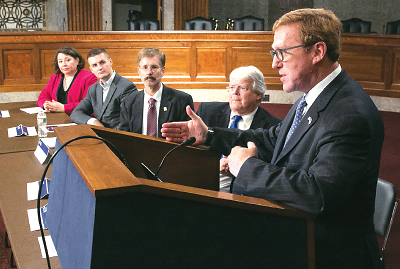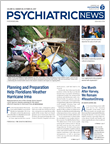At a briefing on Capitol Hill last month sponsored by APA, speakers urged members of Congress to expand the opportunities for health care professionals to engage in telemedicine, including telepsychiatry. In particular, they voiced their support for CONNECT for Health Act (S 1016, Creating Opportunities Now for Necessary and Effective Care Technologies), a bipartisan bill first introduced in the Senate in 2016 and reintroduced this past spring. It has been referred to the Senate Finance Committee.
The CONNECT for Health Act seeks to remove several Medicare restrictions on telehealth and remote patient-monitoring services. This includes allowing the types of clinical sites eligible for reimbursement to be expanded and enabling telehealth services to be reimbursed in a bundled payment with other services. The 2017 version of CONNECT tweaks some of the provisions for reimbursement while also adding a major change—it allows the secretary of Health and Human Services to remove additional restrictions on reimbursement in the future without requiring legislation when certain quality and cost-effectiveness criteria are met.
These changes will improve access to care across medicine, but will be especially valuable in mental health care, where cliniciains are in limited supply and demand is high.
Sylvia Trujillo, J.D., a senior counsel for the AMA, said that quick action on this bill is essential. “We have little time to prepare for a seismic change in health care.” Trujillo pointed out that according to the U.S. Census Bureau, by 2030 (just 13 years away) more than 1 in 5 U.S. residents will be age 65 or over, and this population will have access to a diminished number of younger caregivers.
“While we advocate for CONNECT, we also ask CMS [Centers for Medicare and Medicaid Services] to use all existing flexibilities to use these proven technologies,” she continued.
Trujillo also noted that CONNECT—sponsored by Sen. Brian Schatz (D-Hawaii) and co-sponsored by Sens. Ben Cardin (D-Md.), Thad Cochran (R-Miss.), John Thune (R-S.D.), Mark Warner (D-Va.), and Roger Wicker (R-Miss.)—is just one of several telehealth-related bills under consideration in Congress. Their failure to become law is due in part to bureaucratic delays, but also to some concerns by the Congressional Budget Office (CBO) that expanded telehealth services may not be cost neutral for Medicare.
On that subject, Peter Yellowlees, M.D., a professor of clinical psychiatry in the UC Davis Health System, believes that the CBO is mistaken, especially with regard to mental health costs.
“Emergency department visits and hospitalizations are the biggest drivers of costs, and these outcomes go down with telehealth,” he said. Yellowlees added that the Veterans Administration—which oversees a large, Medicare-like population—has strong national data that back this claim.
Yellowlees highlighted two other policy measures that should be short-term priorities for the federal government. One of these is to change the CMS rule that allows reimbursement for telehealth services provided only in rural areas. Many urban patients, such as elderly individuals in nursing homes, are just as limited in accessing care as people in rural communities.
The second is to modify language in the Ryan-Haight Act that prohibits the dispensing of controlled substances over the Internet without a “valid prescription.” A valid prescription is one that is issued for a legitimate medical purpose by a practitioner who has conducted at least one in-person medical evaluation of the patient or a covering practitioner. Because of the nature of telemedicine, meeting that requirement can oftentimes be difficult, said Yellowlees. ■
Information on telepsychiatry, including explanatory videos, can be accessed
here. The text of the CONNECT for Health Act of 2017 is available
here.

